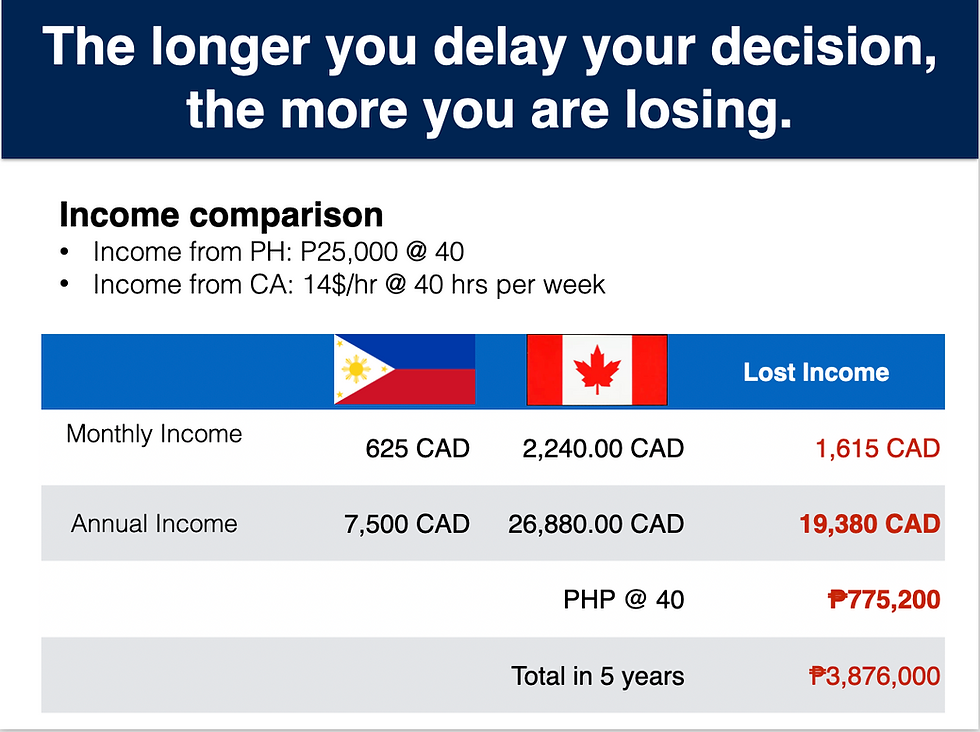Income Opportunities: Canada vs. the Philippines – Why Immigrating to Canada Makes Sense
- PIACORP Consultancy

- Jan 5, 2025
- 5 min read

When considering immigration, one of the key factors that influence the decision is the potential for financial growth and job security. Many people are drawn to countries that offer better income opportunities, higher living standards, and the ability to achieve long-term financial stability. Canada, known for its thriving economy and high quality of life, presents compelling advantages over many countries, including the Philippines. This post compares the income opportunities in Canada and the Philippines, highlighting why Canada could be the ideal destination for those looking to build a better future.
1. Average Income Comparison
One of the first and most obvious differences between Canada and the Philippines lies in the average income levels.
Canada: According to recent data, the average annual income in Canada is approximately CAD 55,000–60,000(about PHP 2.1 million to 2.3 million). This figure varies depending on the industry, location, and experience level, but even entry-level positions can offer a starting salary that’s well above what most workers in the Philippines can expect. For example, an entry-level position in Canada may pay anywhere from CAD 35,000–45,000 annually, whereas in the Philippines, similar roles might pay between PHP 250,000–350,000 annually, reflecting a significant difference in purchasing power.
Philippines: The average annual income in the Philippines is much lower. As of recent reports, the average income for Filipino workers is around PHP 200,000 to 300,000 annually (approximately CAD 5,000 to 7,500), though this can vary widely by profession. While some professionals in the Philippines earn more (doctors, lawyers, and engineers), many industries offer lower wages due to the lower cost of living and economic factors.
In short, the average income in Canada is significantly higher than that of the Philippines, especially when you consider the relative purchasing power and the social services that come with higher salaries in Canada.
2. Cost of Living and Purchasing Power
While Canada’s wages are higher, it’s important to consider the cost of living. Canada is known for its high standard of living, but the cost of living can vary widely depending on the province or city. Major cities like Toronto and Vancouver have a higher cost of living, particularly when it comes to housing. However, even with higher living costs, Canadian salaries generally provide a much better standard of living compared to the Philippines.
Canada: The cost of living in Canadian cities is high, but this is offset by the higher wages and robust social benefits. For instance, rent for a one-bedroom apartment in the heart of Toronto or Vancouver can range from CAD 1,800 to 2,500 per month, while in smaller cities like Calgary or Montreal, the cost can be closer to CAD 1,200–1,500. In comparison, while groceries and everyday goods may be more expensive in Canada than in the Philippines, the higher income levels make it more manageable.
Philippines: The cost of living in the Philippines is significantly lower. Rent for a one-bedroom apartment in Metro Manila can range from PHP 15,000 to 30,000 per month, depending on the location, which is substantially cheaper compared to Canada. However, this lower cost of living is tied to the lower average wage, and individuals often have less disposable income to save, invest, or spend on non-essential goods and services.
3. Job Opportunities & Employment Sectors
Canada’s diverse and growing economy offers a wide range of job opportunities, many of which provide higher salaries and better benefits than what is available in the Philippines.
Canada: The Canadian labor market is characterized by a mix of industries, including technology, healthcare, engineering, finance, education, and skilled trades. High-demand sectors such as IT, software development, nursing, and construction regularly offer competitive salaries, which allows individuals to build their careers and achieve financial growth quickly. Moreover, the Canadian government supports job creation, providing programs that encourage innovation and growth in various sectors. Many skilled workers in Canada benefit from employer-provided benefits, including healthcare, retirement savings, and paid leave. Additionally, the minimum wage in Canada is higher than that in the Philippines, typically ranging from CAD 14 to 16 per hour depending on the province.
Philippines: In contrast, the job market in the Philippines offers fewer high-paying opportunities. While industries like business process outsourcing (BPO), healthcare, and education are expanding, many entry-level positions pay lower wages, and skilled professionals may still earn less than their counterparts in Canada. Moreover, while there are opportunities for growth, particularly in the tech and medical sectors, the overall salary scale in the Philippines remains lower. Many workers face a competitive job market with limited benefits compared to the comprehensive health and retirement programs available in Canada.
4. Social Services & Benefits
One of the most significant advantages of moving to Canada is the availability of social services and benefits, which significantly improve financial security and quality of life.
Canada: Beyond high salaries, Canada offers a comprehensive social safety net that includes universal healthcare, employment insurance, childcare subsidies, pensions for seniors, and various other social welfare programs. Canadian workers enjoy health benefits like free medical consultations, surgeries, and hospitalization without incurring significant out-of-pocket costs. In addition, Canada has a progressive taxation system, where wealthier individuals contribute more, but they also receive more in terms of public services and support. Canadian citizens and permanent residents can access education, healthcare, and retirement benefits, making it easier to save for the future.
Philippines: While the Philippines has programs like PhilHealth (health insurance) and SSS (Social Security System), the coverage and benefits are limited compared to Canada. Many Filipinos rely on private insurance or out-of-pocket payments for healthcare, which can be financially burdensome. Additionally, the public retirement system in the Philippines is often insufficient to maintain the quality of life for seniors, leaving many individuals dependent on family support or personal savings.
5. Taxation and Financial Security
Although taxes in Canada are relatively high, they contribute to the country’s strong public infrastructure, including the healthcare system, social safety nets, and education. The tax system in Canada is designed to support the welfare of all citizens, with progressive rates based on income level.
Canada: High-income earners in Canada are taxed at higher rates, but in return, they enjoy comprehensive social services, a high standard of living, and a strong social safety net. Even with taxes, many Canadians are able to achieve significant savings, homeownership, and long-term financial security.
Philippines: The tax system in the Philippines is generally lower, but with fewer services available in return, individuals often struggle with accessing healthcare, education, and other basic services. With a larger informal economy and less robust public programs, financial security can be more challenging to achieve in the Philippines.
6. Career Growth and Professional Development
Canada: Canada offers abundant opportunities for career advancement, professional development, and networking. The country values skilled labor and offers various immigration programs (like the Express Entry Program) for qualified individuals, ensuring that skilled professionals can find opportunities to succeed. Canadian employers also place a strong emphasis on work-life balance, which improves overall job satisfaction.
Philippines: In the Philippines, while there is certainly room for career growth, many industries still face limitations in terms of salary progression and opportunities for advancement, especially in certain regions outside of Metro Manila.
Conclusion: Why Immigrate to Canada for Income Opportunities?
While the Philippines offers a lower cost of living and a vibrant economy, Canada provides more attractive income opportunities, better social services, and a higher quality of life overall. The difference in average salaries, job opportunities, healthcare benefits, and social security makes Canada a far more lucrative option for those seeking long-term financial growth and stability.
If you’re looking to secure a better future for yourself and your family, Canada’s robust economy, coupled with its comprehensive social services, makes it one of the most desirable destinations for immigrants. With high wages, a strong social safety net, and opportunities for career advancement, Canada offers a financial environment that is hard to match.
If you’re ready to take your career and quality of life to the next level, immigrating to Canada could be the perfect decision for you.








Comments